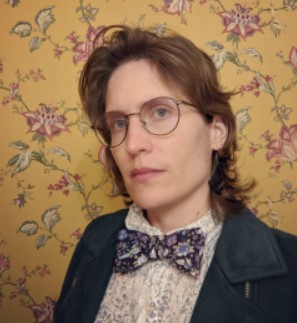Written by Amanda Delio
 Rua Williams is an Assistant Professor in the User Experience Design program. They study interactions between technology design, computing research practices, and disability justice. In 2022 they were selected for the first cohort of the Just Tech Fellowship a project of the Social Science Research Foundation (SSRC). According to the website "the fellowship supports and mobilizes diverse practitioners to imagine and create a more just, equitable, and representative technological future". Being tasked to understand the world re-imagined to make positive changes, Professor Williams began the execution of a project they called Cyborg Imaginaries.
Rua Williams is an Assistant Professor in the User Experience Design program. They study interactions between technology design, computing research practices, and disability justice. In 2022 they were selected for the first cohort of the Just Tech Fellowship a project of the Social Science Research Foundation (SSRC). According to the website "the fellowship supports and mobilizes diverse practitioners to imagine and create a more just, equitable, and representative technological future". Being tasked to understand the world re-imagined to make positive changes, Professor Williams began the execution of a project they called Cyborg Imaginaries.
Professor Williams began by interviewing disabled people who use adaptive and assistive technologies. They strongly felt that the medical-industrial complex controls what kind of body a person can have. They decide if you get a wheelchair and what kind. Multiple people make such a decision by fighting with one another over the circumstances, but the decision is never the ultimate choice of the disabled persons themselves.
Although technology is not medicine, people treat it as such when it comes to disabilities. For example, mechanized knees are safely standardized to fit military veterans, which means that when other people use prosthetics, they can be uncomfortable and unsafe. The necessary adjustments needed are considered "prohibited" because the safety standard assumes a vastly different body. There has been a fight going on for a long time for what could keep disabled individuals alive, comfortable, and integrated into society to have a decent quality of life.
With the research information in mind, Professor Williams asked the participants, "If this world was different what kind of body would you have?" That question led them to co-design sessions about what kind of equipment and technologies would they imagine for themselves if nobody were there to tell them no. Professor Williams plans to turn those code designs into artifacts for exhibition. Williams has contracted disabled artist Rachel Slick to paint portraits of participants in the style of Humans of New York. The series will be called "Common Cyborgs" and each portrait will be paired with a vignette from their interviews.
Also featured, is a gigantic pink spider made by Michelle Renee Hoppe. The spider was crafted to express autistic movements as aesthetic, desirable, and joyful. It is based on the work of Fernand Deligny who charted the motion paths of autistic children and noted they formed spider webs.
At the end of the fellowship, Williams and their students will have a series of 2D and 3D mock-ups of the exhibits for Cyborg Imaginaries which will be used to collaborate with museum curators on a future exhibition.
*gigantic pink spider. https://womanmade.org/artwork/shelli-hoppe/
